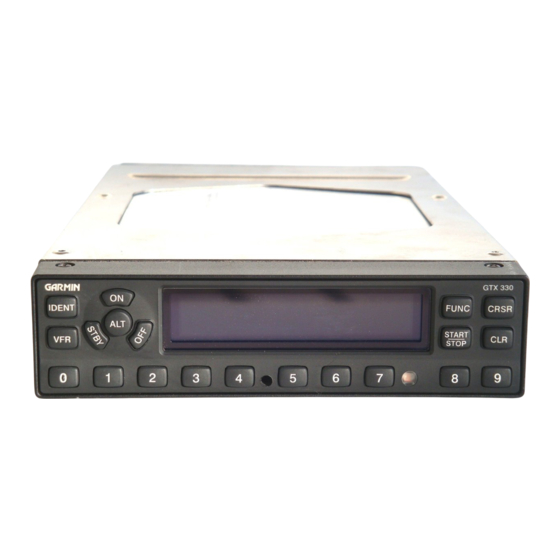- ページ 5
アビオニクス・ディスプレイ Garmin GTX GTX 330DのPDF インストレーション・マニュアルをオンラインで閲覧またはダウンロードできます。Garmin GTX GTX 330D 49 ページ。 Mode s transponder
Garmin GTX GTX 330D にも: パイロット・マニュアル補遺 (50 ページ), パイロット・マニュアル補遺 (50 ページ), パイロット・マニュアル (13 ページ), パイロット・マニュアル (13 ページ)

1.
GENERAL DESCRIPTION
1.1
INTRODUCTION
This manual describes the physical, mechanical, and electrical characteristics and the installation requirements for the
GTX 330 Mode S Transponder and GTX 330D Diversity Mode S Transponder. In this manual, the term GTX 330
applies to both transponders unless otherwise stated. Information pertaining to the maintenance, alignment, and
procurement of replacement parts is found in the GTX 330 Maintenance Manual, P/N 190-00207-05. After
installation of the GTX 330, FAA Form 337 must be completed by an appropriately certificated agency to return the
aircraft to service.
1.2
EQUIPMENT DESCRIPTION
The Garmin GTX 330 is a panel mounted Mode S Transponder with the addition of timers, altitude reporting, mode S
interrogation and reply, and multiple transmit/receive ARINC 429 and RS232 data ports. The Mode S transponder
has the capability to transmit a unique address for every aircraft.
The GTX 330 is a radio transmitter and receiver that operates on radar frequencies, receiving ground radar or TCAS
interrogations at 1030 MHz and transmitting a coded response of pulses to ground-based radar on a frequency of
1090 MHz. The GTX 330 is equipped with IDENT capability that activates the Special Position Identification (SPI)
pulse for 18 seconds.
As with other Mode A/Mode C transponders, the GTX 330 replies with any one of 4,096 codes, which differ in the
position and number of pulses transmitted. By replying to ground transmissions or TCAS interrogations, the
GTX 330 enables ATC to display aircraft identification, altitude and ground speed as well as identification numbers
on ATC radar screens or TCAS traffic indicators.
The GTX 330 is configured with all key controls. The layout of the front panel keys and displays segregates the
transponder's primary functions from the secondary functions. The unit can be configured so the aircraft avionics
master bus can turn the unit on.
1.3
INTERFACE SUMMARY
The GTX 330 provides the following interface connections via the rear connector:
•
Ten (10) encoding altimeter inputs.
•
External IDENT input.
•
External STBY input.
•
External suppression pulse input.
•
Switched power output of up to 1.5 amps (for digital altitude encoder power).
•
Aircraft power input (11 to 33 volts).
•
Aircraft dimming buss input voltage.
•
Aircraft master switch turn-on option.
GTX 330 Installation Manual
190-00207-02
Page 1-1
Rev. 1
